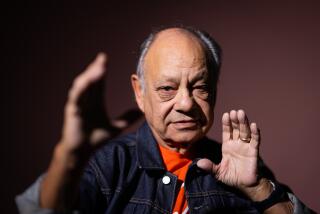Skater’s gift weighs more than gold
- Share via
Adande’s runner-up column:
TURIN, Italy -- The greatest moment for black people at these Olympics was not when Shani Davis won his speedskating gold medal. It was when Joey Cheek won his.
Davis became the first black athlete to win an individual gold in the Winter Olympics when he beat the field in the 1,000-meter event. As he said, “It’s a breakthrough, but it’s what people make of it.”
Is it a victory for the black kids who teased him when he wore his speedskating tights or a Bonnie Blair sweatshirt when he was younger? Is it a victory for the black people, including Bryant Gumbel, who say they don’t watch the Winter Olympics?
After Cheek won the 500-meter gold he announced he would give his $25,000 United States Olympic Committee bonus money to Right to Play, an organization that promotes health and opportunities through sports for disadvantaged children in Africa, the Middle East and Asia. Later, Cheek donated the $15,000 he earned by finishing second to Davis in the 1,000.
When I look at Right to Play’s website, promotional pamphlets and the videos playing in the temporary office at the Olympic village, I see black kids. Lots of black kids. Smiling black kids.
Cheek wants his donation to go to Sudanese refugees living in Chad. Ethnic clashes in the Darfur region of Sudan led to mass killings and the displacement of more than a million people.
“After years of [training] and years of people sacrificing so I can be the best in the world, I feel that it is imperative for myself, and also for anyone else who’s able to reach a pinnacle of their career or whatever they’re striving for, to reach out a hand and help somebody else,” Cheek said.
What does the money mean? Conrad Alleblas, an associate director in Right to Play’s Dutch fundraising and marketing office, said that for the programs he works with in Uganda, a year’s worth of sports and play programs for one child costs $15 to $20.
“We use these games to teach children about health and their body and teamwork,” Alleblas said. “If you look at $40,000, it’s approximately two to 2 1/2 thousand children. That’s a big commitment.”
And that’s just one, suddenly small part of the wave of giving Cheek inspired. Responding to Cheek’s challenge, his corporate sponsors have pledged more than $250,000. Money from individual donors has pushed the grand total past $300,000.
The day after Cheek’s 500-meter victory, the number of hits on www.righttoplay.com jumped to 90,000 -- an increase of almost 80,000 above the normal daily traffic.
“My colleagues in Holland, they are all like this on the telephone,” Alleblas said, picking up imaginary phones with his left and right hands.
Speedskating is the No. 1 winter sport in Holland, so anything that happens in that domain is huge. Cheek’s donation “was mentioned on all of the newspapers and TV channels,” Alleblas said. “It is the talk of the day in Holland.”
How did Cheek, a native of Greensboro, N.C., who looks like a 20-something Opie Taylor, come to feel so responsible for the welfare of thousands of African kids he’d never met? For one thing, speedskating got him traveling. And when you leave the United States you escape the news cocoon that blocks out 99% of the events that occur outside our borders.
So while CNN focused its attention on celebrity court cases and the latest missing blond woman, Cheek was watching the sister station, CNN International, which covers real issues around the world. He was riveted by the Sudan story when the violence escalated in 2003.
“I found it odd that it was such a big story overseas and I came home and so rarely did I see any coverage,” Cheek said. “If anything, it was a little crawler across the bottom. Our State Department declared genocide. I found it amazing that there would be such an enormous thing -- ‘genocide,’ that word conjures up ‘Holocaust’ -- a hundred thousand people killed by a government, and no one even knew about it.
“I don’t think anyone even knew where Darfur was. In fact, before I started traveling, I couldn’t tell you where Darfur was either. That was why I chose that specific region and why I wanted to focus on one area.”
The region is so unstable that Cheek can’t visit it. He’ll be part of a Right to Play delegation to Zambia, where the organization will promote HIV/AIDS awareness and prevention. But Right to Play founder and Chief Executive Johann Olav Koss assured Cheek his money would go toward helping the Darfur refugees.
The way Koss sounded at a news conference Thursday, I think he’d do whatever Cheek asked.
Koss, a four-time speedskating Olympic gold medalist from Norway, had followed Cheek’s career and met him in passing, but had never really known Cheek before Cheek requested a meeting two weeks ago.
“We were talking about a lot of different things in our lives, particularly Joey’s wish to help children in need and his compassion and also his thinking about what he’s been doing on the ice rink and how he could use that leverage for much bigger things,” Koss said.
“I came away from the conversation, [as] always admiring him as a speedskater, but I’m even more impressed as an individual. Not only from his compassion and his person as giving to others, but also his intellectual capacity and his ability to think in much larger aspects of the world.
“I was stunned, because it was only three days before his race. I know the pressure you are under and I know what you go through in those days, but he had time to meet with me and have coffee and kind of relax. I thought ‘Wow, this is a truly remarkable individual.’ ”
Cheek is remarkable, which is why it isn’t fair to hold anyone else to his standard. What they do with the bonus money they earn is entirely their privilege.
Davis, as before the Olympics, will work with kids of all races, encouraging them to pursue their dreams. His message: “Stick with it.”
Now he can use the gold medal as proof, after all of the years he finished in 10th or 11th place.
He says it doesn’t matter what the pursuit, be it an Olympic gold medal, a Heisman Trophy or a Golden Globe award, it can be accomplished.
Cheek is providing the ultimate example of what you can do after you accomplish your dream.
An image behind him at the news conference showed an African kid doing his best Joey Cheek impersonation, his torso bent over and his arm flying straight up like a speedskater coming down a straightaway, a reminder that inspiration and affiliation can cross oceans, borders and even racial lines.
*
J.A. Adande can be reached at [email protected]. To read more by Adande, go to latimes.com/adandeblog.
More to Read
Go beyond the scoreboard
Get the latest on L.A.'s teams in the daily Sports Report newsletter.
You may occasionally receive promotional content from the Los Angeles Times.






